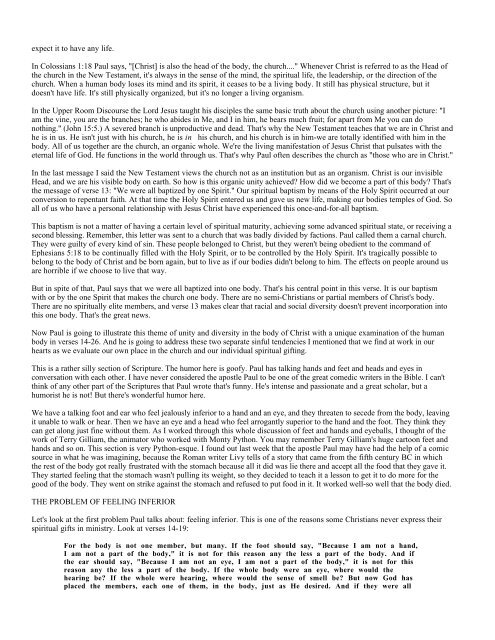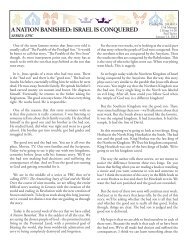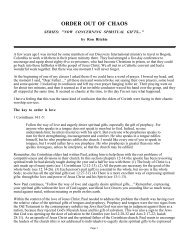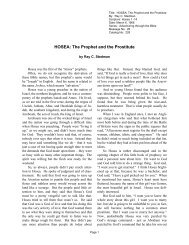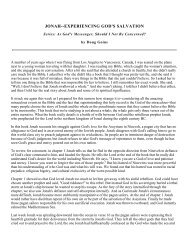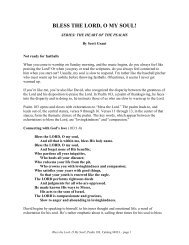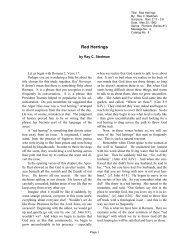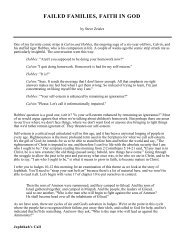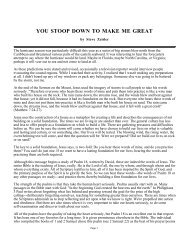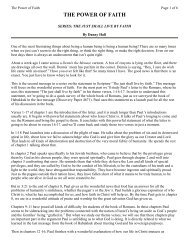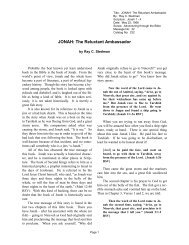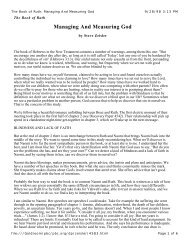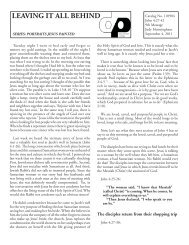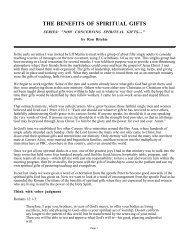Netscape: UNITY AND DIVERSITY IN THE BODY OF CHRIST
Netscape: UNITY AND DIVERSITY IN THE BODY OF CHRIST
Netscape: UNITY AND DIVERSITY IN THE BODY OF CHRIST
Create successful ePaper yourself
Turn your PDF publications into a flip-book with our unique Google optimized e-Paper software.
expect it to have any life.<br />
In Colossians 1:18 Paul says, "[Christ] is also the head of the body, the church...." Whenever Christ is referred to as the Head of<br />
the church in the New Testament, it's always in the sense of the mind, the spiritual life, the leadership, or the direction of the<br />
church. When a human body loses its mind and its spirit, it ceases to be a living body. It still has physical structure, but it<br />
doesn't have life. It's still physically organized, but it's no longer a living organism.<br />
In the Upper Room Discourse the Lord Jesus taught his disciples the same basic truth about the church using another picture: "I<br />
am the vine, you are the branches; he who abides in Me, and I in him, he bears much fruit; for apart from Me you can do<br />
nothing." (John 15:5.) A severed branch is unproductive and dead. That's why the New Testament teaches that we are in Christ and<br />
he is in us. He isn't just with his church, he is in his church, and his church is in him-we are totally identified with him in the<br />
body. All of us together are the church, an organic whole. We're the living manifestation of Jesus Christ that pulsates with the<br />
eternal life of God. He functions in the world through us. That's why Paul often describes the church as "those who are in Christ."<br />
In the last message I said the New Testament views the church not as an institution but as an organism. Christ is our invisible<br />
Head, and we are his visible body on earth. So how is this organic unity achieved? How did we become a part of this body? That's<br />
the message of verse 13: "We were all baptized by one Spirit." Our spiritual baptism by means of the Holy Spirit occurred at our<br />
conversion to repentant faith. At that time the Holy Spirit entered us and gave us new life, making our bodies temples of God. So<br />
all of us who have a personal relationship with Jesus Christ have experienced this once-and-for-all baptism.<br />
This baptism is not a matter of having a certain level of spiritual maturity, achieving some advanced spiritual state, or receiving a<br />
second blessing. Remember, this letter was sent to a church that was badly divided by factions. Paul called them a carnal church.<br />
They were guilty of every kind of sin. These people belonged to Christ, but they weren't being obedient to the command of<br />
Ephesians 5:18 to be continually filled with the Holy Spirit, or to be controlled by the Holy Spirit. It's tragically possible to<br />
belong to the body of Christ and be born again, but to live as if our bodies didn't belong to him. The effects on people around us<br />
are horrible if we choose to live that way.<br />
But in spite of that, Paul says that we were all baptized into one body. That's his central point in this verse. It is our baptism<br />
with or by the one Spirit that makes the church one body. There are no semi-Christians or partial members of Christ's body.<br />
There are no spiritually elite members, and verse 13 makes clear that racial and social diversity doesn't prevent incorporation into<br />
this one body. That's the great news.<br />
Now Paul is going to illustrate this theme of unity and diversity in the body of Christ with a unique examination of the human<br />
body in verses 14-26. And he is going to address these two separate sinful tendencies I mentioned that we find at work in our<br />
hearts as we evaluate our own place in the church and our individual spiritual gifting.<br />
This is a rather silly section of Scripture. The humor here is goofy. Paul has talking hands and feet and heads and eyes in<br />
conversation with each other. I have never considered the apostle Paul to be one of the great comedic writers in the Bible. I can't<br />
think of any other part of the Scriptures that Paul wrote that's funny. He's intense and passionate and a great scholar, but a<br />
humorist he is not! But there's wonderful humor here.<br />
We have a talking foot and ear who feel jealously inferior to a hand and an eye, and they threaten to secede from the body, leaving<br />
it unable to walk or hear. Then we have an eye and a head who feel arrogantly superior to the hand and the foot. They think they<br />
can get along just fine without them. As I worked through this whole discussion of feet and hands and eyeballs, I thought of the<br />
work of Terry Gilliam, the animator who worked with Monty Python. You may remember Terry Gilliam's huge cartoon feet and<br />
hands and so on. This section is very Python-esque. I found out last week that the apostle Paul may have had the help of a comic<br />
source in what he was imagining, because the Roman writer Livy tells of a story that came from the fifth century BC in which<br />
the rest of the body got really frustrated with the stomach because all it did was lie there and accept all the food that they gave it.<br />
They started feeling that the stomach wasn't pulling its weight, so they decided to teach it a lesson to get it to do more for the<br />
good of the body. They went on strike against the stomach and refused to put food in it. It worked well-so well that the body died.<br />
<strong>THE</strong> PROBLEM <strong>OF</strong> FEEL<strong>IN</strong>G <strong>IN</strong>FERIOR<br />
Let's look at the first problem Paul talks about: feeling inferior. This is one of the reasons some Christians never express their<br />
spiritual gifts in ministry. Look at verses 14-19:<br />
For the body is not one member, but many. If the foot should say, "Because I am not a hand,<br />
I am not a part of the body," it is not for this reason any the less a part of the body. And if<br />
the ear should say, "Because I am not an eye, I am not a part of the body," it is not for this<br />
reason any the less a part of the body. If the whole body were an eye, where would the<br />
hearing be? If the whole were hearing, where would the sense of smell be? But now God has<br />
placed the members, each one of them, in the body, just as He desired. And if they were all


